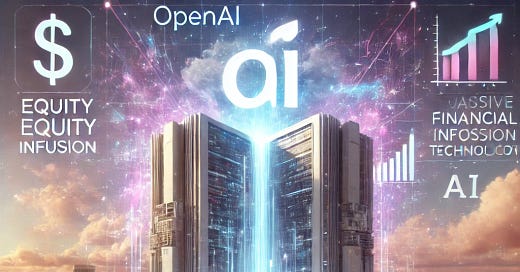OpenAI Grows into a $157 Billion Behemoth, with $6.6 Billion Equity Infusion
OpenAI Gets $6.6 Billion Equity Infusion
In a landmark development for the artificial intelligence industry, OpenAI has successfully closed a monumental funding round, raising $6.6 billion at a staggering valuation of $157 billion. This historic investment not only cements OpenAI's position as a leader in the AI sector but also signals the growing importance and potential of AI technologies in shaping our future.
The Funding Round and Investors
The latest funding round was spearheaded by Thrive Capital, with participation from a roster of high-profile investors including Microsoft, Nvidia, SoftBank, and Tiger Global. This influx of capital will enable OpenAI to significantly intensify its AI research, boost computing capabilities, and develop tools to address complex challenges in various fields.
OpenAI's valuation has almost doubled in a short span, reflecting the immense potential investors see in the company’s technologies. The funding also underscores how critical AI applications are becoming across diverse sectors, from healthcare to finance, to education.
Strategic Implications
Expansion of AI Research and Development
The infusion of capital is expected to supercharge OpenAI’s research and development. The company is set to enhance its AI models, improve popular tools like ChatGPT, and explore new frontiers in artificial intelligence. With the competition intensifying, this financial boost will help OpenAI maintain its competitive edge by pushing the boundaries of AI research.
Computational Power Boost
OpenAI's need for vast computational resources is pivotal for training its advanced language models. A significant portion of this funding will be channelled into expanding its computational capabilities, making it possible to power more complex and demanding AI tasks, thereby enabling the development of more sophisticated models and applications.
The Microsoft Partnership and Transition to For-Profit
OpenAI's partnership with Microsoft has been a cornerstone of its recent success, albeit not without its controversies. Microsoft has invested billions into the company and serves as the exclusive cloud provider for all of OpenAI's workloads. This close-knit relationship has prompted discussions about OpenAI's independence and raised questions about its commitment to its founding mission of ensuring AI benefits all of humanity.
Initially established as a non-profit in 2015, OpenAI has been progressively transitioning toward a for-profit model. The creation of a for-profit subsidiary in 2019 with Microsoft as its major investor marks a pivotal shift. Reports suggest that OpenAI is considering a complete transition to a for-profit benefit corporation, a move that may remove it from the oversight of its non-profit board. This change reflects the need to secure funding and talent to thrive in a rapidly evolving AI landscape.
Sam Altman's Potential Equity Stake
A noteworthy development is the potential equity stake for OpenAI CEO Sam Altman. Despite previously stating he had no equity in OpenAI, recent reports indicate that Altman may now be granted a 7% stake in the company. With the company valued at $157 billion, Altman’s stake could be worth over $10 billion, potentially making him one of the wealthiest individuals in the world.
However, these reports are still speculative. OpenAI’s board chair, Bret Taylor, has clarified that while there have been discussions around compensating Altman with equity, no final decision has been made, and details remain fluid.
Competitive Landscape
Despite OpenAI’s strong financial position, the company faces formidable competition from both tech giants and emerging players in the AI space.
Google DeepMind
Google DeepMind, renowned for its breakthroughs like AlphaGo, remains one of OpenAI’s fiercest competitors. With Google’s vast resources and DeepMind's research capabilities, it continues to pose a significant challenge to OpenAI’s dominance.
Anthropic
Founded by former OpenAI researchers, Anthropic has made strides with its AI model, Claude. Anthropic’s commitment to ethical AI development and its focus on safety and alignment could pose a challenge to OpenAI's position in responsible AI.
xAI
Elon Musk's AI venture, xAI, seeks to develop systems capable of understanding the universe's fundamental truths. Though still in its early stages, Musk’s ambitions and track record make xAI a potential disruptor in the AI landscape.
Industry Impact and Future Outlook
OpenAI's record-breaking funding round is likely to have far-reaching effects on the broader AI industry.
Acceleration of AI Innovation
With increased capital in hand, OpenAI will likely accelerate innovation in AI, prompting its competitors to quicken their own research and development efforts to keep pace. This investment could ignite a new phase of rapid advancements in AI technologies.
Potential for Industry Consolidation
OpenAI has actively discouraged its investors from funding rival AI firms, potentially setting the stage for industry consolidation. A more concentrated market could see resources and talent coalescing around a few dominant players, making it harder for smaller startups to thrive.
Regulatory Scrutiny
As OpenAI and other AI companies grow more powerful, regulatory scrutiny is expected to intensify. Policymakers may start examining the societal impacts of AI more closely, with particular attention to concerns around market competition, data privacy, and the ethical use of AI.
Summing Up
OpenAI’s recent $6.6 billion funding round marks a pivotal moment not just for the company, but for the entire AI industry. As it continues transitioning from its non-profit roots to a for-profit juggernaut, OpenAI will need to strike a delicate balance between pushing the boundaries of innovation and adhering to its founding mission of ensuring AI benefits humanity. With increasing competition, rapid technological advancements, and growing regulatory scrutiny, the next few years will be crucial for OpenAI and the broader AI sector1.





